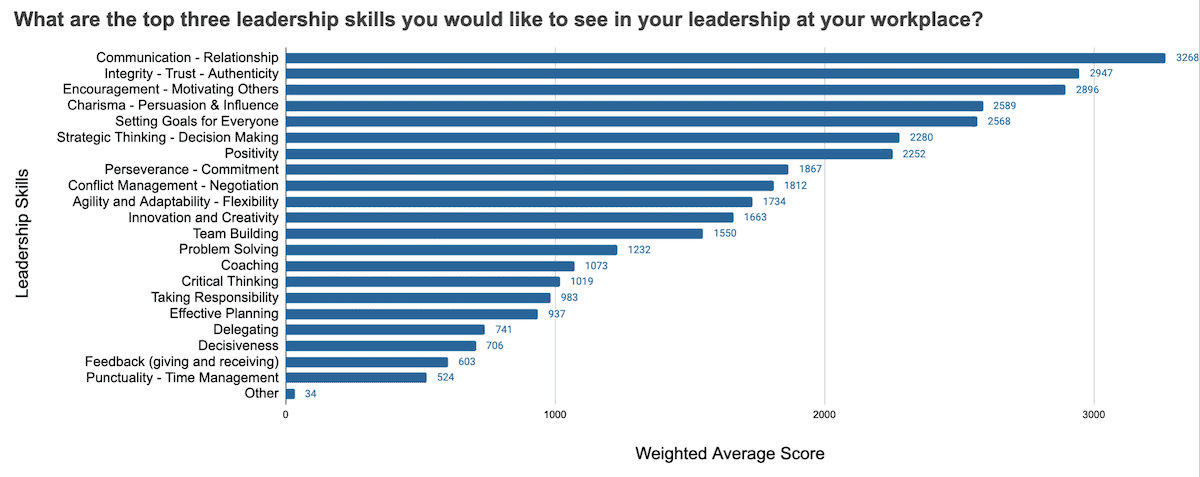Top 21 Team Leadership Skills – Are You A Good Team Leader?
Whether you are the team leader of a few functional people or hundreds or thousands of people, you need team leadership skills. Professionals want to see 21 different leadership skills in their management (*). Do you want to be a good team leader? You must excel in these leadership skills.
In this article
📌 Hint: Do not skip this article, you will find FREE Leadership Training resources throughout the article.
We’ve focused on the team leader roles, team leadership skills, and cross-functional leadership.
* We’ve surveyed 6,992 professionals and asked them a single question: “What are the top three important leadership skills you would like to see in your leadership at your workplace?”. The results are inspiring. You can read more in the 21 Leadership Skills Professionals Expect to See at the Workplace article.
Who is A Team Leader?
Before going through the team leadership skills, let us explain who the team leader is, the role of a leader, and cross-functional team leadership.
A team leader is the manager or leader of a group of people, the team, who are trying to achieve a mission. Typically, the leader is ultimately responsible for the team’s actions and results in an organization and accountable for the performance of the team. Depending on the size of the work, organization, and project, the team leader can manage from a few people to thousands of people.
Role of a Team Leader
In today’s world, team leader roles are typically the first-level leadership roles after the functional roles in the departments. For instance, if you are looking into a software development department, you can see small teams of three to seven people, with a team leader. For instance, front-end, back-end, test, etc roles can have leader roles. Typically, team leader roles are referred to as the first-level supervisors between the functional roles and managers. Some of the common team leader roles are:
- Analyst Team Leader
- Project Team Leader
- Technical Project Leader
- Development Team Leader
- Test Team Leader
You can add many similar roles to this list.
Cross-Functional Team Leadership
Cross-functional team leadership is managing or leading people coming from different departments, teams, or functional roles. This leadership style is critical for matrix and multinational organizations where there are several departments that come together to execute projects.
Cross-functional team leadership is becoming popular nowadays with project teams working on diverse domains. For instance, consider a project team trying to develop an e-commerce website. The team consists of:
- 2 Business Analysts: Analysts gather the customer requirements, and document them into technical specifications.
- 4 Software Developers: Developers are developing the website.
- 1 Test Engineer: The test engineer tests the development of software developers, finding bugs, reporting them, and testing the functionality of the website before showing it to the customer.
- 1 Project Manager: Guides the team to the completion of the project, managing communication with customers and other departments.
In this scenario, the project manager is performing cross-functional team leadership by leading people from different roles.
Enhance Your Team Leadership Skills – Executive Leadership Training Program
San Francisco Business School offers an online, self-paced comprehensive executive leadership training program. You can consider enrolling in this program to improve your leadership skills.
Top 21 Team Leadership Skills
We’ve surveyed 6,992 professionals enrolled in professional business training programs at San Francisco Business School. We listed 21 top team leader skills and asked the survey participants to pick the most important three team leadership skills they would like to see in their leaders or managers. Below are the results.

Let’s go through each of these team leader skills and explain why they are important to be a good team leader. While you are reading each of these skills, ask yourself self “Am I a good leader enough to show this skill for my team?
1- Team Leader Must Be a Good Communicator
The team leader manages its team and encourages the team members to perform at their best and reach the goals of the team and organization. To ensure this, team leaders have to establish several communication channels within the team or cross-functional departments. For instance, you may need to ask for a resource from another team or a document or anything that is required for your team. To be able to get what you need, you must be a good communicator. That is why it is at the top of the 21 team leader skills.
2- Team Leadership Requires Integrity
The team leader is the role model of the team. They should be inspiring the junior team members and a model for the organization on what kind of people will be promoted to leadership roles. Therefore, team leaders must be trustable, and authentic. They have to be at the same distance as all team members about professional topics or work-related points.
3- Team Leader Should be an Excellent Motivator
Successful work results are achievable only if there is good teamwork. To have good teamwork, all individuals in the team should be motivated so that you can get the maximum performance from each of your team members. You can use incentives, promotions, or other methods to encourage your team members. Even showing people empathy and spending time with them for their self-interest will boost their performance.
Watch Laura’s 30 Seconds Experience – Executive Leadership Program
Hear from Our Alumni Laura Smith, Head of Design. Laura attended the Executive Leadership Program at SFBS.
4- Team Leader Skills – Charisma, Persuasion and Influence
Charisma, persuasion, and influence are important team leader skills as well. Charisma is described as compelling attractiveness or charm that can inspire devotion in others. However, in business, charisma is a little bit more than personal appearance. Typically, leaders who have expert power, who are knowledgeable in their domain, are found charismatic by their subordinates.
You can improve your technical knowledge in your domain to increase your expert power and develop your charisma. This will increase your persuasiveness and influence on other people which in result produces better work results.
5- Team Leader Qualities – Set Goals for Everyone
Professionals expect fair distribution of tasks and workload among the team members. This does not mean that a senior team member will have a similar task to a junior team member. The team leader should know the competence, level, experience, and capacity of each team member and assign tasks and goals accordingly. Otherwise, there might be a feeling of “unfair management” among the team members and this can cause underperformance of the team.
6- Strategic Thinking – Decision Making
Strategic thinking and decision-making are about predicting future outcomes, evaluating current conditions, and making the best decision today. Team leadership requires strategic thinking like a chess master. With the parameters in your hand, you need to be able to make the next best move to achieve.
7- Team Leadership Requires Positivity
Sometimes, positivity is confused with seeing things through rose spectacles. However, positivity refers to being optimistic. Teams are affected by the mood and behavior of the leader immediately. If the leader is not positive, the team will tend to underperform respectively.
Free Online Leadership Skills Training Program
One of the requirements to be a good leader is to improve yourself continuously. The best way to do this is, to enhance your competence through training. Take a step ahead and jumpstart your leadership competence. Enroll in our 1-hour Free Leadership Training program.
8- Perseverance – Commitment
Would you be willing to have ever-changing goals, tactics, and targets in your work? That would be exhausting and demoralizing. No matter what it costs, leaders should do everything they can to reach the goals of the team. This is called perseverance and commitment. If leaders give up on the roadblocks or problems they face, teams will sacrifice as well.
9- Conflict Management
Conflicts can arise between team members and cross-functional teams as well. For instance, if the organization has only one scarce resource and if that resource is required for different projects at a time, conflicts may arise between the team leaders. Or, the group members might conflict on a technical resolution of a problem. Team leadership requires seeking a win-win resolution in conflicts, if not possible, then, try to achieve a resolution that will make the majority of the parties happy. In some cases, autocratic leadership approaches may be used.
10- Team Leader Should Be Agile and Adaptive
We are living in an ever-changing world. Depending on the goals and projects, the team may need to change its direction, methods, and processes. The team leader should be the supporter and pioneer of agility and adaptability. Leaders should guide and instruct their teams to adapt to changing conditions.
11- Innovation and Creativity in Team Leadership
Leaders should be innovative and creative and they should foster creativity among their team. The best way to encourage innovation and creativity in a team is by maximizing group collaboration and valuing different ideas and perspectives.
12- Team Building
Team leadership requires excellent team-building skills. Tuckman identifies team formation through four stages, Forming, Storming, Norming, and Performing.
- Forming: The team is gathering at this stage. The team is structured, and no one knows each other enough.
- Storming: The team starts to perform and interpersonal conflicts start to arise.
- Norming: In this stage, team members are creating new ways of doing and being together. Team members start to trust each other.
- Performing: The most productive stage of the team. Everyone knows each other, and support is at the highest degree.
Leaders should be aware of the arising conflicts within the team and seek a resolution quickly. Also, team building activities such as gathering for non-work related meetings, celebrating milestones, and verbal appreciation are crucial for team building.
13- The Team Leader is an Effective Problem-solver
Have you ever faced a problem-free life or project? It is in the nature of life and projects, problems are inevitable. The important thing is, being proactive and trying to eliminate problems before they occur. If a team leader cannot prevent a problem from occurring, then, they should be able to solve it quickly.
14- Coaching Team Leader
Professionals look for coaching team leaders. Who doesn’t want to grow their competence and enhance their career opportunities? Leaders should try to apply servant leadership or transformational leadership skills.
15- Critical Thinking
Critical thinking is the analysis of available facts, evidence, observations, and arguments in order to form a judgment by the application of rational, skeptical, and unbiased analyses and evaluations. Team leaders avoid making emotional decisions. They are quantitative and rational.
16- Taking Responsibility
Team leadership requires having the ultimate responsibility of the team. When everything goes on track, no problem, the success accounts for the team. However, when there are issues, everyone might be looking for a scapegoat and there can be pressure on the team. The leader must absorb the pressure and ensure the team works seamlessly.
17- Effective Planning in Team Leadership
Businesses run time-critical projects. Therefore, planning skills are important for team leaders. You can consider enrolling in project management courses to enhance your effective planning skills.
18- Team Leader is a Delegator
Professionals like delegating leaders. They want to be accountable for their activities. So, they want their leadership to set the goals and expectations, and give them the way to perform their activities. However, some team leaders or managers are not confident after assigning tasks to their team.
Micromanagement is a pattern of manager behavior marked by excessive supervision and control of employees’ work and processes, as well as a limited delegation of tasks or decisions to staff. Typically, micromanagement is a flaw of new leaders or managers and professionals hate it.
19- Team Leader Decisiveness
20- Team Leadership Feedback (giving and receiving)
In many cases, team leaders or managers come together with their team members annually or every six months to make a performance review. This is a very long period. Leaders should be visible and approachable. The feedback mechanism should be two-way. Leaders should give feedback to the team members, well, this is normal. However, leaders should be mature enough to receive any type of feedback from team members as well.
Actually, feedback is one of the best ways to see how others see you. Therefore, make sure you establish a productive feedback mechanism in your organization.
21- Team Leader Should Be Punctual – Time Management Skills
Typically, team leaders and managers are very busy. Their calendar may shift during the day. However, they must find a way to plan important meetings on time. Even if they need to reschedule, they should be informed in advance instead of a no-show. So, professionals expect their management to have punctuality and time management leadership skills.
How to Become a Good Team Leader – Develop Your Leadership Skills
Have you considered if you have each of the above team leader skills? None of the skills are god-gifted. There are several ways to develop your team leadership skills. We will go over the top 5 ways to develop your leadership skills.
1- Leadership Skills Courses/Programs
We should distinguish the courses and programs. The leadership courses focus on particular skills development while the programs focus on the entire leadership skills development. For instance, San Francisco Business School offers an Executive Leadership Program.
Executive Leadership Training Program Covers:
- Generic & Adaptive Leadership – Change is inevitable and leaders must be prepared for the changing dynamics of the business environment. Learn how to adapt your leadership in changing circumstances.
- Grasping Power – Only powerful leaders sustain in a brutal business environment. You’ll learn how to grasp power.
- Servant Leadership – Leaders must be adaptive, servant, and transformational in today’s business world. Walk the path to be a servant leader that empowers people and organizations.
- Emotional Intelligence – Emotional effects are unavoidable wherever there is a human factor. Develop your competence to be an agile, optimistic, and humble leader. Learn how to show people why they matter.
- Tomorrow’s Leaders – You cannot lead the millennials the same way as you do for boomers. Increase your awareness for future leadership and transformational leadership.
- Leadership in Hard Times – While being an optimist leader, you have to be ready for the unanticipated cases. Improve your contingency planning skills, dealing with conflict of interest, and how to overcome a crisis.
You can check further on the program page. Enrolling in courses or programs is the most popular and effective way to develop team leadership skills.
2- Coaching
In coaching, the coach guides the coachee through real-life scenarios. In some cases, the coach can help the trainee with the real cases the trainee faces at work. There are several coaching programs available on the web. However, make sure to choose the right coach for you. It is important to choose a coach from a similar or even the same industry, who has gone through your career path before and who can guide you transparently.
3- Practicing
As in any profession, the best method to sharpen your leadership skills is practicing. Whenever you see a chance to practice your skills, do not hesitate. For instance, if you see a conflict between your colleagues, you can seek a resolution. Or, help a team member to make a decision.
4- Reading
You can consider reading leadership books, articles, or business blogs. There are phenomenal leadership books. You can make a reading list, and read those books to sharpen your leadership skills. You might be interested in our John C. Maxwell – Top 5 Leadership Books article.
5- Events
There are conferences, seminars, and webinars about leadership. You can follow these activities and attend them if they fit your schedule.
Note that, there are other ways to develop leadership skills such as volunteering, giving back, or on-the-job training. We’ve listed the most popular 5 ways to improve leadership skills.
Watch 5 Ways to Develop Team Leadership Skills YouTube Video
Summary
Team leaders guide, instruct, inspire, and steer their team to reach the vision, mission, and goals of the team. Typically, team leader roles are first-level functional leadership roles managing a team of three to seven people such as analyst team leader.
There are 21 top leadership skills that team leaders should demonstrate when leading their teams. These skills can be earned through five fundamental ways, courses or programs, coaching, practicing, reading, and events.

